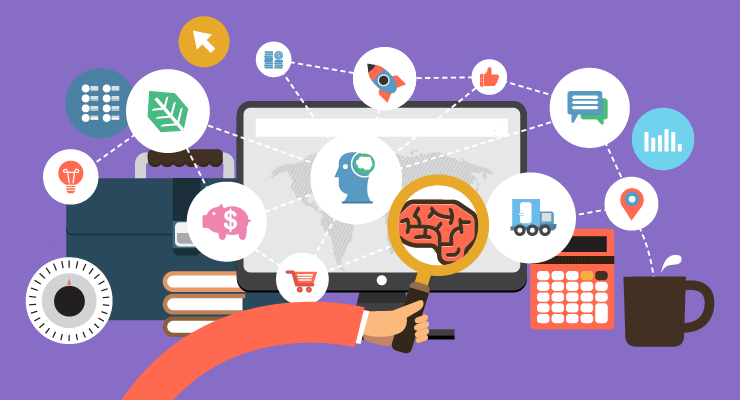Technology continues to push the boundaries of what ecommerce can achieve, from digital transformation and software-as-a-service to virtual reality and artificial intelligence. Every day, something new vies for the attention of online retailers, thanks to ever-increasing technological breakthroughs. You’ll never be short on fresh and interesting things to explore – the true challenge is choosing the finest chances for your ecommerce business.
Artificial Intelligence is bringing change to the Ecommerce industry
Artificial intelligence isn’t just a new technology used for the sake of its “wow factor”. AI implementation has the ability to affect a wide range of business operations across your company. Understanding the components of artificial intelligence will help you comprehend how it might affect your organization.
The definition of AI is broad, and encompasses data mining, natural language processing, and machine learning.
- Data mining is the process of collecting both current and historical data in order to make predictions.
- Natural language processing is concerned with the human-computer connection and how computers comprehend natural human speech.
- Machine learning entails employing a set of algorithms to apply prior knowledge or offer examples in order to solve a problem. Deep learning is defined as “the process of layering algorithms in order to get a better comprehension of data.”

Benefits of Using Artificial Intelligence in Ecommerce Companies
The advantages of artificial intelligence and similar technologies have long been acknowledged by Amazon. Machine learning is used by the behemoth ecommerce company to better product selection, user experience, and logistics.
In a recent report, McKinsey & Company and the Retail Industry Leaders Association identified seven imperatives for reimagining retail in 2021, each of which might be aided by AI-based technology in some way.
- More targeted marketing and advertising.
- Increased customer retention.
- Seamless automation.
US companies making sales by using AI
By gathering data about your consumers, automating follow-up abandoned cart enquiries, and more, AI can help you develop a more effective sales process. Customers can be guided through the funnel by interacting with chatbots for simple questions.

This chart shows that the share of consumers who have engaged by chatbots
How to Implement Artificial Intelligence in Ecommerce?
It’s always tempting to dive headfirst into new and fascinating technologies. However, you’ll want to have a plan in place before launching a new programme to ensure you don’t waste time and money on false starts.
- Create strategy
You must begin somewhere, and your plan will outline the steps necessary to reach your AI goal. Don’t leave it to a freshly hired AI expert or your CIO or CTO to handle. Put some serious thought into what you want to achieve with AI. Take a pragmatic attitude and remember to begin small. You may always build on your achievements in the future.
- Find narrow use cases that are relevant to the overall corporate strategy.
Business objectives, data differentiation, and widely available artificial intelligence models all come together in the most effective AI use cases. To summarise, you should concentrate on revenue-generating possibilities where you have a data edge and where established AI technology may be used.
- Leverage third-party expertise.
Even if you’re an armchair AI specialist, you’ll want to enlist professional help on this one. Bring in a professional team to help you establish a strategic AI roadmap on a project or part-time basis. Those third parties can also aid in the development of your MVP (minimum viable product).
- Build a full-scale solution.
It’s time to build the full-scale solution once you’re satisfied with what your team has created. Don’t be shocked if it takes a few cycles before it works the way you want it to. You’ll see increased advantage from the initiatives you execute as you and your team become more comfortable working in the AI realm.
In future AI may sound like something out of a movie, but there’s plenty of AI technology available today that can improve customer experience, increase conversion rates, and help businesses run more efficiently. Look into the different benefits of artificial intelligence if you want to provide the greatest possible shopping experience on your ecommerce website.







